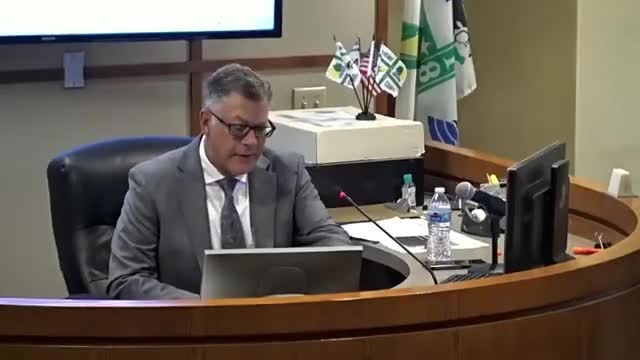McHenry County board debates 2026 draft budget and whether to use a levy "look‑back" to raise property tax base
Get AI-powered insights, summaries, and transcripts
Subscribe
Summary
County board members on Oct. 16 debated whether to place the draft 2026 budget and an associated levy "look‑back" on 30‑day review, splitting members over using reserves and technical fixes versus a one‑time increase to property tax capacity.
McHenry County Board members debated the draft fiscal 2026 budget during the Committee of the Whole meeting on Oct. 16, focusing on a proposed levy “look‑back” that would raise the county’s levy base to capture previously unclaimed levy capacity.
Chairman Bueller said the draft budget would be put on 30‑day review before the board votes on it at the Nov. 18 meeting. "At that meeting, we will be putting the draft budget for the 2026 fiscal year on 30 day review," he said.
The discussion centered on several competing approaches: adopt only the allowable increases for new growth and the consumer‑price index (CPI), or use a look‑back to set the levy base at about $73.8 million and then abate a portion of it. Finance staff described the math: last year’s levy was about $65 million; with CPI (2.9 percent) and new growth it would reach roughly $67.7 million, while the look‑back raises the base to about $73.8 million with a proposed abatement of about $1.7 million. Board members and staff repeatedly cited a roughly $4.4 million difference between the look‑back proposal and a CPI + new growth approach.
Finance and Audit Committee Chair Mike Scala said the materials before the board "reflect a budget of 287 plus million dollars for the entire county" and described the committee’s work on which items to include. Carrie (finance staff) presented charts showing prior levy amounts, the effect of CPI and new growth, and where the 4.4 million gap results from not having previously captured inflationary increases.
County Treasurer Donna Kurtz urged caution about relying solely on reserves and described a cash shortfall the treasurer’s office faced earlier in the year. "We just ran out of money, so I sold investments," Kurtz said, warning that some investment income that helped past budgets would not be replaceable.
Those opposed to using the look‑back argued it would be effectively a tax increase that compounds in future years. County Board member Terry Greeno said the measure would break a prior promise to voters in her view and called the idea "frankly immoral." Board member Brian Gottemoeller argued the board could defer paying internal debt and not take the look‑back immediately: "We can decide not to pay ourselves $6,000,000 and then I don't have to take $4,400,000 of extra tax money today." Several members pushed staff to produce additional scenarios and to identify further cuts before the final vote.
Board members questioned how one‑time federal ARPA money and advances between internal funds affect long‑term sustainability. Finance staff said roughly $2.8 million of ARPA‑funded costs could return to the general fund over time and that the FICA fund remained negative; members cited figures in the meeting that placed FICA’s shortfall in the low‑to‑mid single‑digit millions.
Several members proposed additional steps to reduce pressure on property taxes, including a hiring freeze, asking departments to identify further cuts, and examining ARPA‑funded positions and one‑time purchases (members asked staff for operating cost estimates for a mobile unit bought with ARPA funds). The chair said the draft budget will remain on 30‑day review and staff will supply more detail before the board’s final vote in November.
Quotes in this article come from speakers at the Oct. 16 Committee of the Whole meeting and are attributed to the speaker listed in the transcript.
The board also handled routine procedural items (a motion to allow two members to attend remotely and a motion to adjourn), and several members flagged individual agenda items they want pulled from next Tuesday’s voting meeting for separate discussion.
Looking ahead, the board will take public comment and hear the draft budget during the 30‑day review period and return to the matter for a final vote at the Nov. 18 county board meeting.
